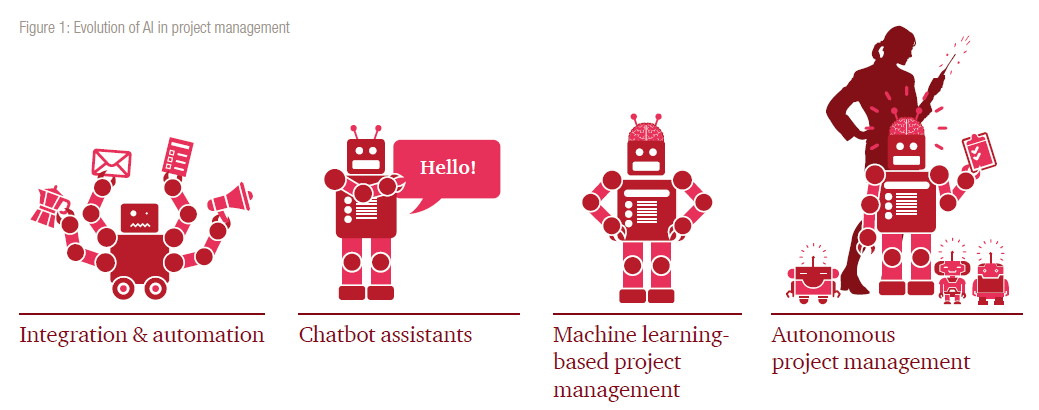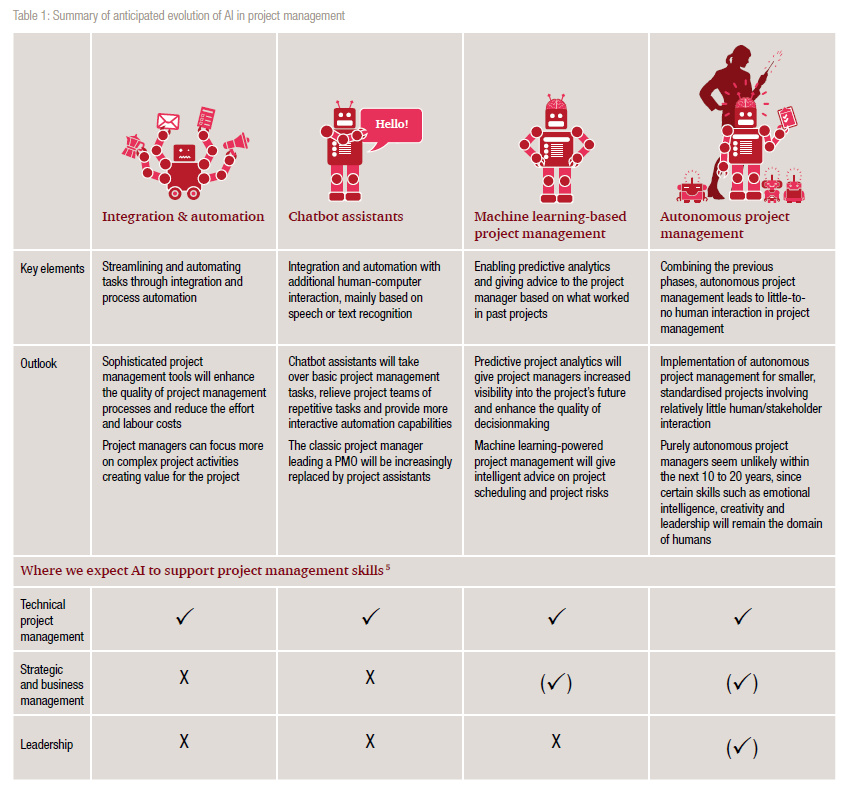
In this article, we will explain how AI is set to change project management practice, what obstacles need to be overcome, and how project managers can prepare themselves to stay relevant in a fully integrated, automated and predictive project management world.
Around 200 years ago the industrial revolution changed society in unimaginable ways for the time. Today another revolution is under way, with even farther-reaching consequences. Artificial Intelligence (AI), experts are predicting, will change everything about the way we produce, manufacture and deliver1.
From manufacturing to utilities and transport to financial services, AI is present in nearly every industry. AI will also change the course of project management practice.
Even though the application of AI software to project management dates back as far as 19872, it is only now that it is really taking off. Beyond data integration and process automation, self-driven project management no longer looks like mere science fiction. However, as we have previously seen with the Internet, big data and all the other technological revolutions of recent times, there are obstacles to be overcome before we reach this technological utopia.
1 “Why Artificial Intelligence Will Change Our World and Why It Needs To Be Purposeful” (Forbes Magazine, May 2016)
2 “The application of artificial intelligence software to project management”, William N. Hosley (PMI Project Management Journal, August 1987)
What is AI?
“The designing and building of intelligent agents that receive percepts from the environment and take actions that maximise its chance of successfully achieving its goals.”
Evolution of AI in project management
The future of project management will be heavily influenced by technological breakthroughs, and there is no doubt that AI will change the course of how project management tasks are delivered and controlled in the future. We are convinced that AI will evolve from simple task automation to predictive project analytics, advice and actions. However, there is something AI cannot do – be human.
Over the years AI has been associated with different terms ranging from cognitive computing and machine learning to natural language processing. What they all have in common is the idea that machines could one day learn by themselves, rather than having to be spoon-fed every instruction or merely acting in accordance with a preprogrammed rule set.
Today the term AI is often used interchangeably with ‘automation’. There is, however, a huge difference: automation is a controlled process that follows pre-programmed logic and rules, while AI is designed to simulate intelligent and even human thinking. To date, a lot of the focus has been on the automation – requiring a certain degree of standardisation – of tasks that are already carried out. However, we consider this as only the first phase in the evolution of AI in project management. This first phase will be followed by chatbot project assistants, machine learning-based project management and, finally, autonomous project management.
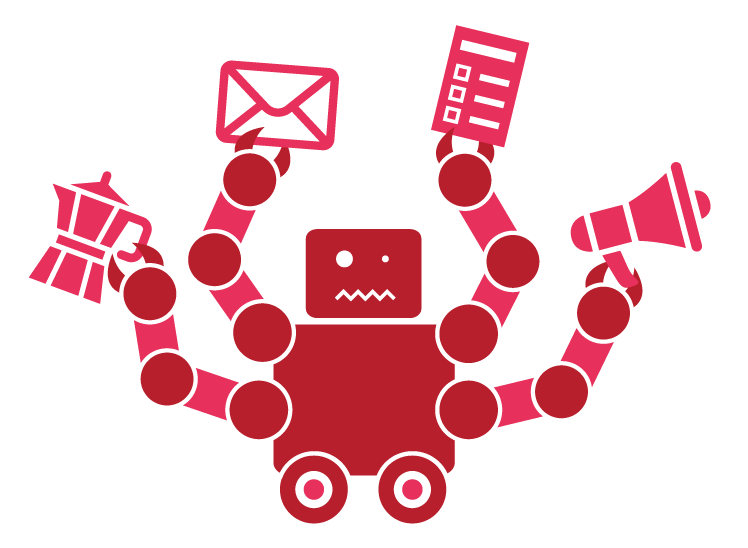
Integration & automation
When it comes to integration and automation there is already a strong focus on streamlining and automating standardised project tasks through workflow integration and process automation. For instance, project budget updates within a database are directly integrated into the budget forecast report without any manual intervention.
Project planning could also be made more robust by enabling auto-scheduling by means of programmed logic and rules, i.e. automatically tracking the progress and status of tasks performed by project team members and alerting a project manager only for intervention in an exception-based scenario. Interaction between incident management tools and project planning tools could be enforced to highlight potential delays based on a high number of defects within certain workstreams.
Current real-life use cases include:
- Interaction between MS Project Online and Wunderlist for task creation and scheduling
- Using online templates and workflows, e.g. in Slack or MS Sharepoint, to reduce time and enhance quality of data
- Sending alerts when potential budgeting or scheduling issues are identified for the project
In our view the trend towards integration and automation will continue in the next couple of years, mainly focusing on more effective project management processes. Enhanced tools for streamlining standardised project management will thus emerge from both existing project management software providers, workflow management vendors and start-ups. This will increase the quality of standard project management processes and reduce the effort and labour costs involved in basic PMO tasks. The resulting automated project management will reduce costs and at the same time free up project managers to focus on more complex project activities and manage the world outside the project (i.e. stakeholder management).
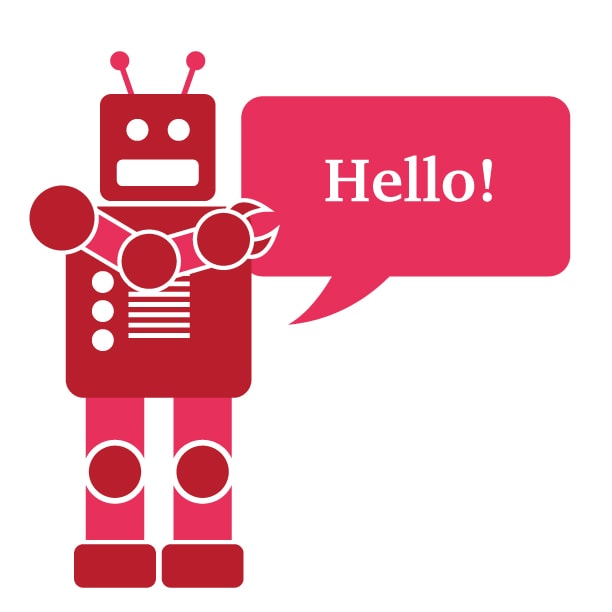
Chatbot assistants
AI chatbots serving as project assistants are considered to be the second phase in the evolution of AI in project management. Bots will take a role in human-computer interaction, mainly based on speech or text recognition.
Chatbots can take over menial tasks such as organising meetings, plan vs progress checks, reminding project team members of scheduled activities, etc. Chatbots can even include initial insights into the existing data. For example, project assistants could answer questions like “what is my team working on today?” or put these questions to team members.
Current real-life use cases include:
- Fireflies.ai is an AI bot for Slack that processes conversations within Slack and recognises tasks and assignments on this basis
- Stratejos.ai sends team members reminders, tracks their performance and enables the project manager to recognise top contributors based on measurables
In our view, analogous to the first phase of project task integration and automation, project assistants will continue to take over basic project management tasks and relieve project teams of repetitive work creating little value. In this regard we expect to see the close integration and plug-in of existing and upcoming technologies relating to human-computer interaction in project management. As a consequence, the role of the classic project manager leading a PMO and its staff will increasingly be replaced by intelligent project assistants (chatbots).
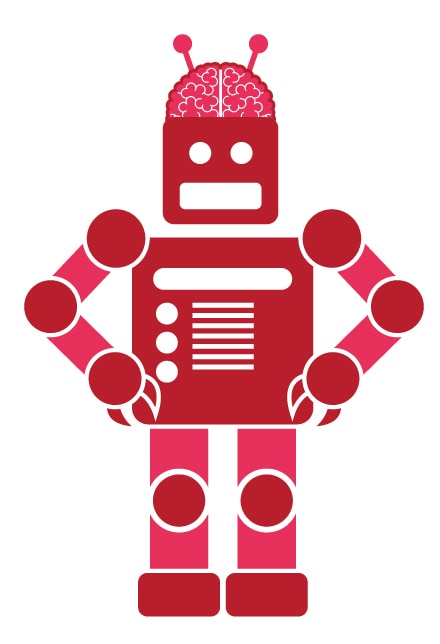
Machine learning-based project management
The third phase of AI in project management introduces machine learning into project management practice. Machine learning enables predictive analytics and can provide advice to the project manager, for example on how to set up and steer the project given certain parameters, and/or how to react to certain issues and risks to reach the best possible outcome based on what worked in past projects.
In the near future, AI could convert mind maps created by project professionals into a semantic network and derive tasks and their relationships from it. For instance, AI-based project scheduling could include lessons learned from previous projects and suggest multiple possible schedules based on the context and dependencies. Furthermore, project plans could be adapted and re-baselined in near-real-time based on historical team performance and project progress. An AI system could even alert the project manager to potential risks and opportunities by using real-time project data analysis.
There are currently only a few examples of the successful integration of machine learning in project management, for example:
- Altering scheduling views according to user permissions and preferences
- Using social tagging to identify and connect users based on their posted comments and to identify the best team for a task
- Machine-learning-based project analytics tool predicting the expected net promoter score (NPS), expected client satisfaction and expected write-off for PwC-internal projects
In our view, predictive project analytics will be the most disruptive innovation in project management in the next ten years. It will give project managers increased visibility into what the future may hold for a project, and will create value by enhancing the quality of decisionmaking. It will also help connect data to effective actions by drawing reliable conclusions about conditions and future events and enabling decisionmakers to identify potential risks and opportunities before they occur. An AI equipped with machine learning could even be enabled to take decisions by itself, which will usher in the fourth phase of AI-based project management evolution. However, this phase will require substantial investment to build capabilities in data analytics and machine learning as a basis for modelling highly complex social and economic project environments.
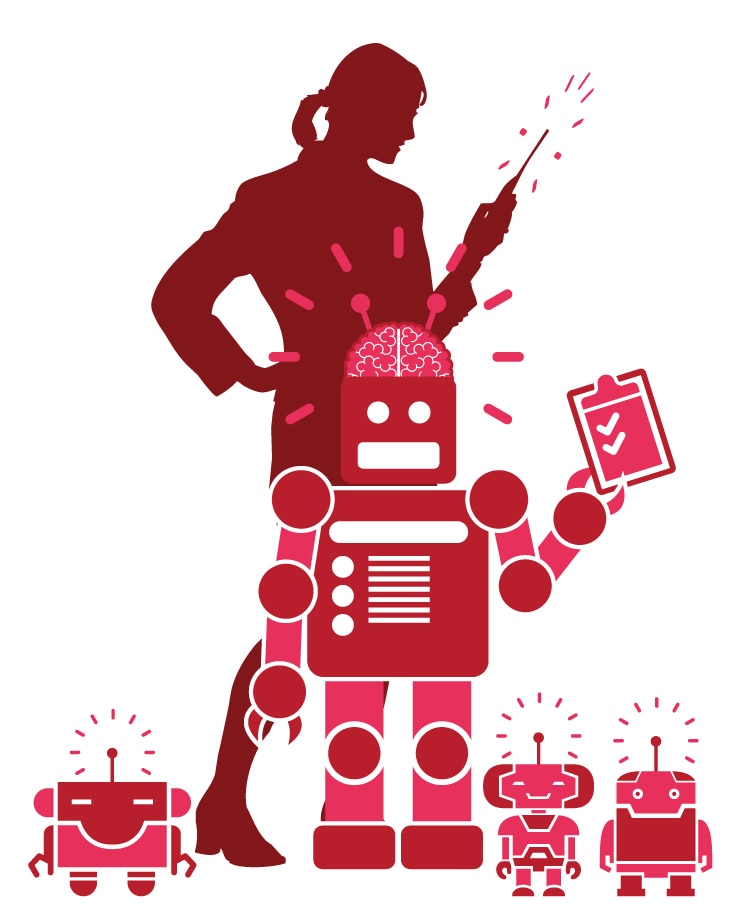
Autonomous project management
Similar to self-driving cars, autonomous project management would only need limited input and intervention from a human project manager.
Besides technical project management processes – which are what the previous three phases primarily focus on – an autonomous project management system will additionally need to comprehensively consider and master the project environment and related stakeholders. These AI systems would therefore have to be able to apply sentimental analysis algorithms to crawl through customer communications and understand stakeholder satisfaction and commitment at any given point in time.
There are currently no real-life use cases supporting fully autonomous project management.
In our view, there might be dedicated areas where autonomous project management could serve as an extension of machinelearning- based project management in the future, especially in small, non-complex projects. However, looking ahead for the next 10 to 20 years, we believe there are unlikely to be purely self-driven artifical project managers. Among other things this is because project budgets and portfolios will ultimately be controlled by humans to manage the risk of autonomous investment decisions.
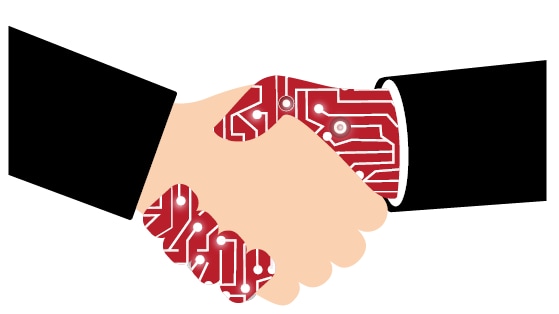
How will AI transform project management
AI creates the possibility of automated processes and intelligent tools that will reduce manual work. However, based on our experience it will require a certain degree of project management maturity. Furthermore, for AI to bring deep insights into a project or projects, it needs to be equipped with a heavy data set from which it can learn what works and what doesn’t. Having large historical data sets and current project information in a standardised form is truly one of the key challenges when it comes to successfully implementing an AI-based project management system.
In addition, if you want to implement an AI system in your existing project management environment, it’s imperative to evaluate what benefits it can actually bring to your projects, as well as your business culture and risk appetite. Do you want simple automation – a digital assistant to take care of menial tasks for you – or do you need it to be more sophisticated and challenge the project in depth? Finally, you also need to carefully evaluate what it will cost to realise these potential benefits.
We see great opportunities for implementing AI-based project systems in large project organisations and in project portfolio management as a way of facilitating predictive steering of complex transformation projects and portfolios, and thus boosting project success and return on investment.
Challenges for the successful implementation of AI in project management
When using AI in project management you also have to remember that project management covers various disciplines. A project manager needs to master all of them to be successful. By contrast with intelligent agents that operate in a defined and stable environment, for example robots producing cars on a production line, given the nature of projects3, and the social dynamic and uncertain environment within which a project has to be delivered, a project management environment is without doubt much more complex.
By way of example, the talent triangle from the Project Management Institute groups the various required skills into technical project management, strategic and business management, and leadership4.
3 PMI defines a project as a ‘temporary endeavour undertaken to create a unique product, service or result’ (A Guide to the Project Management Body of Knowledge, pmi.org)
4 Talent Triangle https://www.pmi.org/learning/training-development/talent-triangle
Technical project management
Technical project management encompasses the various tasks involved in managing and running a project. We believe that these are the areas primarily supported by the AI systems currently available. Intelligent project management assistants, bots and machine learning algorithms support project managers in their daily work by analysing status and providing data-driven insights and forecasts.
Strategic and business management
Strategic and business management skills are required, for example, to analyse, judge (on the basis of both rules and emotions) or prepare business decisions. AI can help by preparing parameters, identifying interdependencies or forecasting business outcomes. The more sophisticated the underlying models and the more accurate the data streams available, the better AI can support the project manager.
Leadership
This area includes various interpersonal competencies such as guiding, leading and motivating people/stakeholders. The AI systems currently available can, for instance, facilitate candidate selection by presenting a short list or ranking based on a defined set of requirements and patterns – but they do not take emotional and/or social dynamics into account. Added to this, leadership and team management are not considered in current AI systems.





